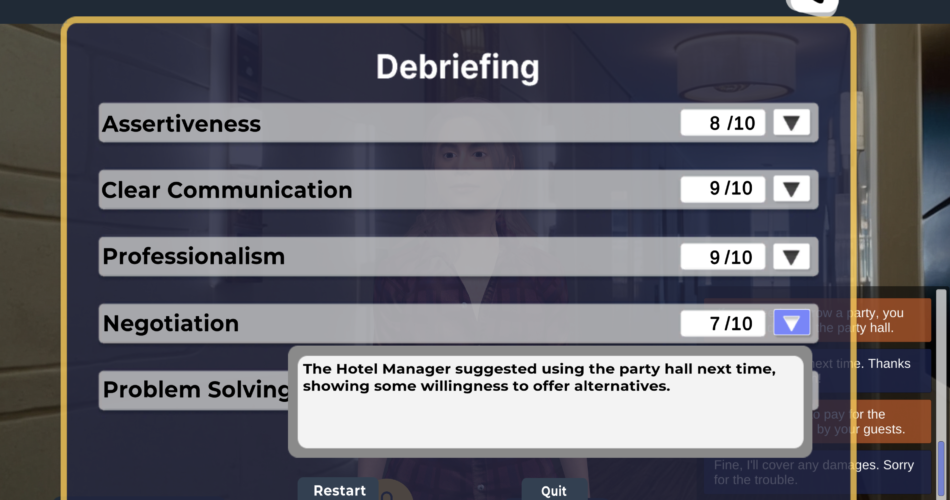In the evolving landscape of workplace training, AI-driven assessments have emerged as powerful tools to enhance employee learning and performance. By utilizing advanced technologies such as AI-based eLearning and AI virtual humans, companies can create personalized, dynamic training programs that deliver more effective learning experiences. These assessments not only help employees acquire new skills but also ensure that organizations achieve better training outcomes. Here’s how AI-driven assessments are transforming workplace training.
1. Personalization of Training Materials
One of the biggest advantages of AI-powered training assessments is the ability to tailor training programs to individual learning needs. AI systems analyze employee performance data to identify knowledge gaps, learning preferences, and areas where additional focus is required. Based on this data, AI customizes the training content to suit each employee’s strengths and weaknesses. This personalized approach enhances engagement, improves retention, and allows employees to progress at their own pace.
2. Real-Time Feedback and Skill Development
AI-driven assessments provide immediate, real-time feedback, enabling employees to understand their performance and areas for improvement as they complete training modules. Whether it’s a virtual scenario with AI virtual humans or a knowledge-based quiz, real-time feedback allows learners to adjust their approach and improve continuously. This instant feedback loop ensures that employees can fine-tune their skills, leading to faster development and better training outcomes.
3. Enhanced Data Analysis and Reporting
AI-driven assessments offer detailed data insights, making it easier for organizations to track employee progress. By using AI-powered debriefing tools, training coordinators can access comprehensive reports on each employee’s performance. These reports include metrics like accuracy, response time, and engagement levels, which help trainers make informed decisions about future training needs and content adjustments. With conversation logs, trainers can also review employee interactions in scenario-based exercises to better understand behavioral patterns and knowledge retention.
4. Adaptive Learning for Better Retention
One of the standout features of AI-driven assessments is their ability to create adaptive learning paths. AI analyzes employee responses and adjusts the difficulty and content of the training based on performance. If an employee is excelling in one area, the system may introduce more complex challenges; if they struggle, the AI can revert to foundational concepts. This adaptive approach ensures that employees receive training that is neither too easy nor too difficult, leading to improved knowledge retention and skill mastery.
5. Objective and Unbiased Evaluations
Human assessments can sometimes be subjective, influenced by biases or inconsistent evaluation standards. AI-powered assessments eliminate these biases, offering objective evaluations based on predefined criteria. Whether assessing technical skills or soft skills like communication and problem-solving, AI ensures that every employee is evaluated fairly and consistently, leading to more accurate performance measurements and equal opportunities for improvement.
6. Scenario-Based Learning and Application
AI-driven assessments often incorporate scenario-based learning, which places employees in realistic, job-related situations. These scenarios, often facilitated by AI virtual humans, help employees apply their skills in a practical, hands-on environment. Whether it’s handling a difficult customer interaction or resolving a team conflict, scenario-based assessments provide an immersive experience that prepares employees for real-world challenges. By practicing in a safe, simulated environment, employees can improve their decision-making and critical thinking skills, which translates into better job performance.
7. Scalability for Large Workforce Training
For organizations with large teams, AI-driven assessments provide the scalability needed to deliver consistent and efficient training across the board. AI can evaluate hundreds or even thousands of employees simultaneously, making it ideal for companies looking to upskill or reskill their workforce quickly. With customizable AI authoring tools, training coordinators can create, update, and deploy assessments rapidly, ensuring that every employee receives up-to-date training that aligns with company goals.
8. Continuous Learning and Development
AI-powered assessments encourage a culture of continuous learning. Employees receive ongoing evaluations and personalized recommendations, which motivate them to keep learning and improving over time. The system’s ability to track progress over extended periods ensures that training doesn’t stop after a single module, but becomes an integral part of an employee’s development journey.
Conclusion
AI-driven assessments are revolutionizing workplace training by offering personalized, scalable, and data-driven solutions that improve both employee performance and organizational outcomes. By leveraging the power of AI virtual humans and adaptive learning techniques, companies can deliver more effective training that meets the unique needs of every employee. As a result, businesses that implement AI in their training programs see improved skill development, better employee engagement, and measurable improvements in productivity and performance.

